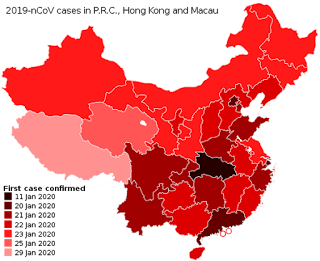Research on Pangolins Leads to Promising Ramifications for Covid-19 Research
While pangolins can be carriers of coronavirus, they may be able to tolerate it through an unknown mechanism according to a recently published study in the journal "Frontiers in Immunology".
"The transmission of pathogens from other vertebrate animals to humans is of particular concern because the resulting diseases, known as zoonoses, have caused major epidemics in the past and continue to pose enormous threats to the human population," the authors state in the journal. The article is entitled, "Pangolins Lack IFIH1/MDA5, a Cytoplasmic RNA Sensor That Initiates Innate Immune Defense Upon Coronavirus Infection."
The pangolins in particular, the statement says, "lack two sensors that detect when a virus enters the body and trigger a sometimes dangerously excessive immune response in other mammals. Understanding how pangolins are able to survive coronavirus infections could help in the development of new treatment options for humans."
I had the pleasure of interviewing one of the study's authors, Leopold Eckhart of Medical University of Vienna, regarding his and his co-authors' findings. He answered questions via e-mail, from Vienna:
1) In your paper you write: "By contrast, IFIH1 a sensor of intracellular
double-stranded RNA, has been inactivated by mutations in pangolins.
Likewise, Z-DNA-binding protein (ZBP1), which senses both Z-DNA and
Z-RNA, has been lost during the evolution of pangolins. These results
suggest that the innate immune response to viruses differs significantly
between pangolins and other mammals, including humans."
What are the implications of this finding and do you reckon that
pangolins are the only animal or mammal for which this is the case?
The absence of these sensor proteins suggests that the immediate
response to infections with several types of RNA viruses is reduced in
pangolins as compared to other mammals (at least those that we have
investigated). However, pangolins have other sensors of RNA viruses,
including RIG-I, and it remains to be investigated how they respond to
coronaviruses and other viruses.
2) What is the best way the layperson could understand the following: "We
put forward the hypothesis that loss of IFIH1 and ZBP1 provided an
evolutionary advantage by reducing inflammation-induced damage to host
tissues and thereby contributed to a switch from resistance to tolerance
of viral infections in pangolins?"
This study provides first insights into how pangolins respond to
infections with RNA viruses. It is possible that pangolins have a unique
way to control infections with viruses and that is why they are very
interesting models for research.
3) Are zoonoses more of a concern now than they were at any other point
in history or are we just seeing a natural evolutionary repurcussion of
humans and animals sharing an increasingly overpopulated world? Explain.
I do not think that zoonoses are more of a concern today than previously
in history but science puts us into a position to better understand
zoonoses. All countries should show respect for nature and allow the
appropriate “distancing” between species.
Will you please extrapolate? What do you mean by distancing?
Poaching and illegal trade with exotic animals increase the risk of
zoonotic diseases. Governments all over the world should stop the trade
with wild animals. They should understand that even a small risk of
transmission of new pathogens can have enormous consequences on public
health and the economy.
4) I see. Thank you. Please talk to me more about pathogens that trigger overreactions. How does this happen and how does/would this phenomenon relate to a pangolin?
Reactions to pathogens are intended to eliminate pathogens. If these
reactions change the vital functions of organs, the response to the
virus can be more damaging than the virus itself. Our results suggest
that pangolins may be less likely to develop overreactions against some
viruses, but more research is necessary to determine if this is the case
for coronaviruses.
5) Is it correct to say that your findings indicate that bats and
pangolins are able to tolerate SARS-CoV-2 and so are carriers, passing
it on to other mammals (humans) that are not resistant to infection?
(Please reword this if I am stating your premise incorrectly!)
Our report should not be overinterpreted. We have found solid data on
genes and we discuss perspectives for biomedical research. Our study was
not designed to test whether pangolins tolerate SARS-CoV-2 or related
viruses. The results of our study indicate that the response to
coronaviruses may be reduced and a reduced defense may be compensated by
tolerance. There are many open questions and more research is necessary.
However, our results suggest that studies of pangolins will be worthwile
because their response to viruses is probably different from that of
other mammals.
What other animals/mammals have you studied?
We have studied the genome sequences of pangolins, bats, carnivorans
(cat, dog, bears), artiodactyls (cattle), primates and other mammals.
6) The following jumped out at me: "Eight species of pangolins form the
mammalian order Pholidota which is most closely related to Carnivora
(cat-like and dog-like carnivorans)."
I wonder about the reports of cats acting as fomites as well as some
including large cats at the Bronx zoo and some domestic animals in
Belgium and the U.S. testing positively for Covid-19; a dog did as well.
Is there are relationship between the dogs' and cats' susceptibility and
the biological constitution of a pangolin and or bat?
In terms of evolution, bats and pangolins are more closely related to
cats and dogs than to humans. This may be relevant for the transmission
of viruses but we cannot draw a conclusion about the susceptibility to a
particular virus. Specific research is necessary to answer your
question.
7) Can you please explain how this would potentially benefit human
patients? You write: While genetic suppression of IFIH1/MDA5 and
ZBP1-dependent pathways had neutral or beneficial effects in the
evolution of pangolins, pharmaceutical suppression of IFIH1/MDA5 and
ZBP1-dependent signaling may be beneficial for human patients with
overreactions to viral nucleic acids.
We propose that the evolution of the defense against pathogens could be
a model for the development of new medical treatments. We do not yet
know how many species respond to viruses but the investigation of
differences in antiviral response could be more fruitful than the
investigation of species that are similar to humans with regard to
antiviral defense. Proteins involved in the response to viral nucleic
acids may be a target of new drugs.
PHOTO: By Piekfrosch, CC BY-SA 3.0, https://commons.wikimedia.org/w/index.php?curid=1788311




Comments
Post a Comment